Diversity, Equity, and Inclusion (DE&I) can be key to the success and financial sustainability of SaaS companies. At first, embracing these principles amplifies a company’s social responsibility. But looking at the big picture, it also significantly impacts innovation, productivity, and overall success. For software teams, the hiring process serves as the cornerstone to fortify these initiatives. It’s a gateway to a workforce rich in references and different problem-solving perspectives.
A conscientious strategy for attracting and retaining software teams directly strengthens DE&I initiatives. By intentionally broadening talent acquisition globally and embracing remote work diversity, SaaS companies inherently advance these objectives. Now, let’s delve deeper into how this approach enhances diversity, equity, and inclusion within software companies.
First Things First: What is Diversity, Equity, and Inclusion (DEI) Strategy?
DEI strategy encapsulates intentional efforts to create a workplace that values and respects differences, promotes equal opportunities, and fosters a sense of belonging for all team members. It’s about actively embracing diversity in backgrounds, experiences, perspectives, and identities, ensuring fair and inclusive practices across all facets of the organization.
The Need for DE&I in Software Companies
What do United States software company demographics currently look like, you ask? For context, the tech industry’s demographic landscape illustrates a HUGE disparity in representation.
White individuals make up around 68% of the workforce, dominating the industry by far. They surpass representation of Asian Americans (14%), Hispanics (8%), and African Americans (7%). This disproportion extends to executive roles, where around 83% are occupied by white tech workers. In contrast, African Americans hold a mere 2% of these positions, while Asian Americans account for approximately 11%. The Data comes from the US Equal Employment Commission’s Diversity in High Tech report.
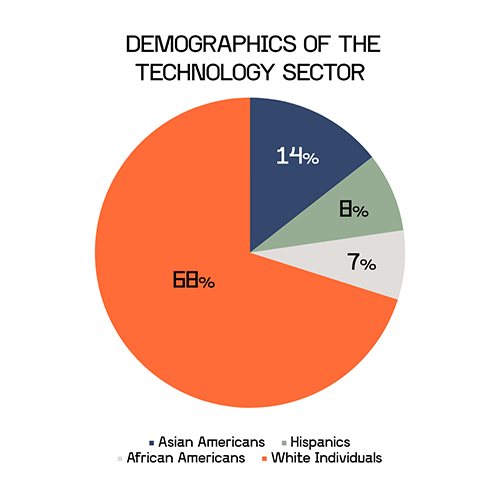
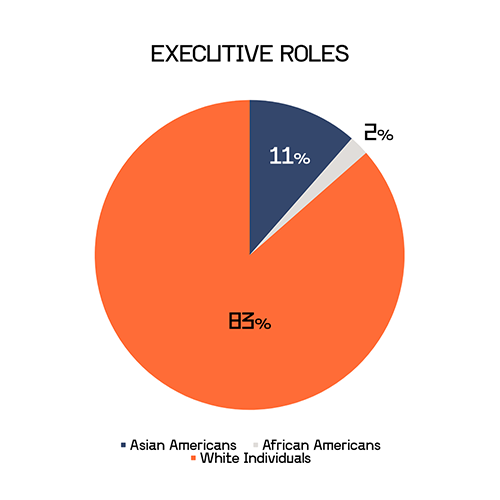
So what about gender? Still according to the report, among high-tech executives, approximately 80% are male. This leaves about 20% as female representatives. In comparison, across the broader private sector, around 71% of executive roles are held by men, with roughly 29% occupied by women.
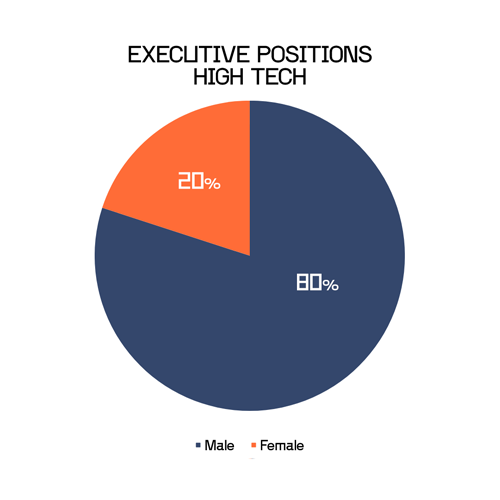
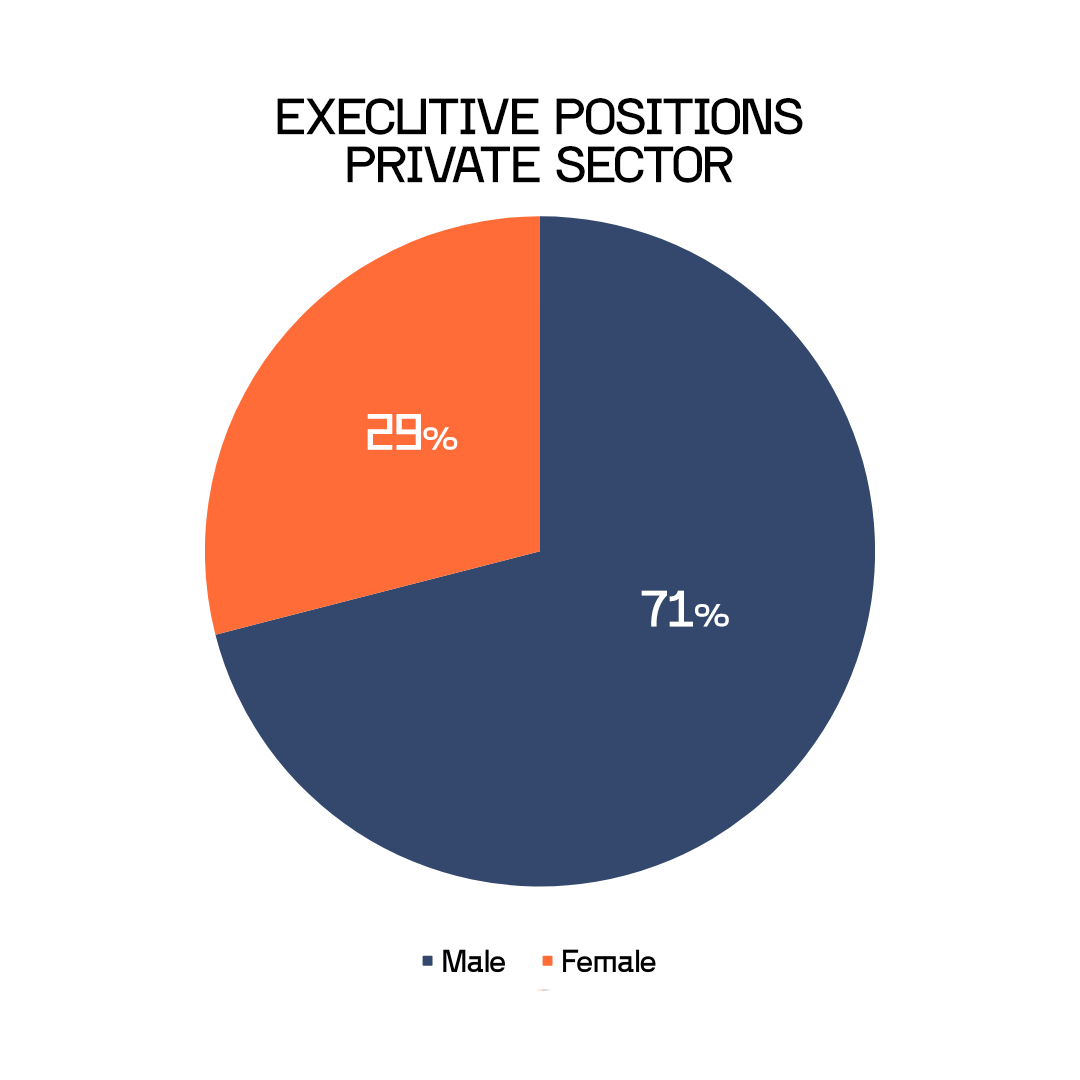
For LGBTQ+ employees in tech, the lack of representation can cultivate an environment of insecurity and discomfort. According to Blind’s report published by CIO, only 76% of LGBTQ+ workers feel safe in their workplace, with an even lower percentage of 64% reported among trans and gender-nonconforming (GNC) individuals. Additionally, a meager 35% of LGBTQ+ employees and 41% of trans or GNC workers feel a sense of representation in upper management within their companies.
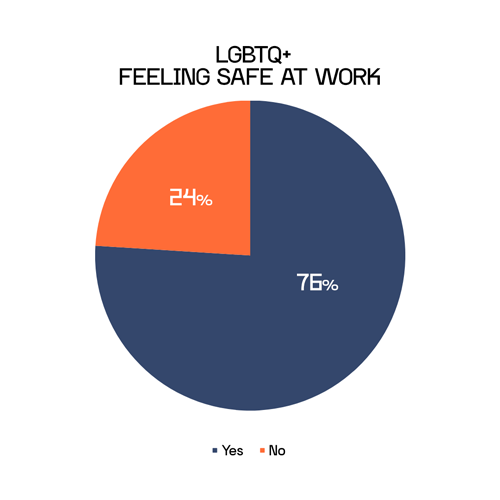
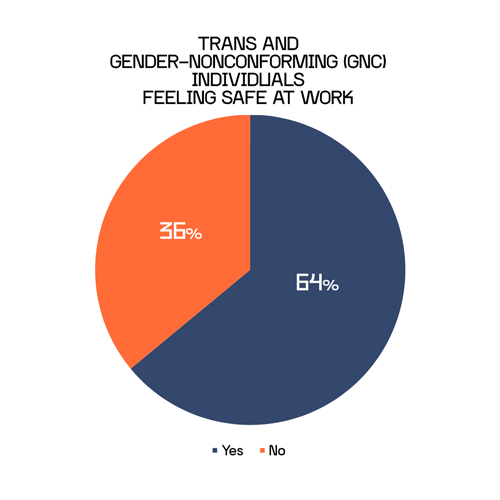
Top 3 DEI Priorities
These issues seem broad and hard to solve. But given this context, what can software business do to boost equity, diversity, and inclusion within their ranks and capabilities?
- Equitable Opportunity and Growth: Imagine a level playing field where everyone gets a fair shot. Software companies can take on the mission of ensuring that opportunities for growth and contribution aren’t limited by where you’re from or what your background is. It’s all about opening doors and creating pathways for everyone to shine within our software teams.
- Inclusive Teams and Leadership: Diversity is just the start; it’s inclusion that really counts. It’s important to create routines and mechanisms, so everyone feels valued, heard, and respected. Placing people in teams is important, but so is making sure everyone’s voice matters. This is usually prevalent in companies where diversity reaches upper management, not just entry-level positions.
- Advancement for All: It’s not enough to get a foot in the door; everyone deserves an equal chance to climb the corporate ladder. Clear expectations for each role and seniority level allow everyone, regardless of background or identity, has a chance to grow. DE&I means anyone and everyone is invited to take on new challenges and reach for the stars within the software development landscape. And is compensated on equal criteria.
3 Ways to Implement DEI and ESG Practices in People Management
Software companies can advance DEI and Environmental, Social, and Governance (ESG) practices in people management through several initiatives. We recommend you begin with 3 steps:
#1 Promoting a Diverse Workforce
Creating an inclusive work culture that celebrates different sexual orientations, diverse backgrounds, and problem-solving approaches fosters innovation within tech companies.
- Think about your marketing strategy: how often are people of color or LGBTQIA+ people featured?
- Is there a glass ceiling in place?
– Are there few women in positions of power?
– Are people of color present at every tier within the organization?
– Who makes the decisions? - Are the policies and practices in place to guide tech leaders on how to identify personal biases and create welcoming environments?
- Are there any committees or safe spaces available for minorities to discuss their particular challenges and feel protected?
#2 Kicking Off Global Talent Acquisition
SaaS companies prioritize sourcing talent internationally to harness diverse skill sets, perspectives, and cultural experiences. This initiative not only strengthens the workforce but also enhances problem-solving abilities within software development teams.
An easy way to go about this is by focusing on reeling in nearshore software engineers in Latin America. This amplifies diversity within software development teams without a big impact on work hours and SDLC routines. More on this further down the article, but know there are 2 ways this also drives social impact:
- Mitigating Brain Drain — Embrace remote work to counteract the brain drain often associated with migration. When you hire software engineers in Latin America but allow them to work within their communities, SaaS companies contribute to retaining local talent while fostering innovation.
- Local Community Empowerment — Remote hiring keeps talent within their communities, empowering local economies and knowledge sharing. This approach promotes the growth of tech ecosystems in regions that may need access to such opportunities.
#3 Enabling Remote Work for Inclusive People Management
Implementing equitable policies related to working hours, accommodating different time zones, and creating a supportive work environment for remote employees nurtures a sense of belonging. This fosters diverse teams to better collaborate. And amplifies software team performance within distributed teams.
In practical terms, remote work and working from home allows the company to cater for team members who:
- Are caregivers to young children, the elderly, or other similar situations.
- Have mobility issues, be it due to disability or otherwise.
- Aren’t able or interested in relocating, keeping their quality of life standards, or close to people and regions they hold dear.
This integrated approach not only increases employee satisfaction but also solidifies the company’s position as a leader in championing diversity, equity, and inclusion within the SaaS landscape.
Actional Insights for DE&I in SaaS Hiring: How to Embrace Nearshore Talent
Expanding Talent Reach With a Fine-Tuned Recruiting Process
Beyond US borders, a goldmine of diverse talent awaits. To supercharge your headhunting and talent mining efforts while boosting DE&I, consider these game-changing strategies:
- 1. Refine Your Search Strings: Utilize Boolean searches on platforms like LinkedIn. Craft diverse search strings that target talent across various backgrounds, including underrepresented groups and different geographies. For instance, use terms that emphasize diverse experiences, skills, and cultural backgrounds.
- 2. Write Inclusive Job Descriptions: Language matters! Craft job descriptions that resonate with a diverse talent pool. Avoid gender-coded language and embrace inclusive terms. Highlight your commitment to diversity in your job postings to attract a wide range of applicants.
- 3. Panel Diversity in Interviews: Say no to an all-white-male interview panel. Aim for diverse interviewers representing various backgrounds and perspectives. This not only signals inclusivity but also provides a multifaceted evaluation of candidates.
- 4. Cultivate an Inclusive Workplace Brand: Showcase your commitment to DE&I in your company’s branding. Highlight employee testimonials, diversity initiatives, and company culture that fosters inclusion. Make it known that your company values diversity from the get-go. Glassdoor and Great Place to Work can be allies here.
- 5. Network in Diverse Communities: Engage with diverse communities both locally and internationally. Attend events, forums, or groups that cater to diverse professionals. Establishing connections and partnerships within these networks can lead to discovering exceptional talent. Women In Tech, People of Color In Tech, and other similar organizations can inspire and show you the way.
- 6. Partnerships and Mentorship Programs: Collaborate with educational institutions or mentorship programs focused on underrepresented groups in tech. Establishing these partnerships not only supports these communities but also creates a pipeline for diverse talent.
By implementing these strategies, you not only expand your talent pool but also ensure that your hiring practices are inclusive and intentional, contributing significantly to your DE&I initiatives while embracing nearshore talent.
Overcoming Accessibility Barriers: Embracing International Talent
In the tech world, many job listings limit applications to US residents only. But why the geographical barriers? In most cases, unless there’s a legal requirement tied to citizenship (like certain governmental positions), there’s no reason postcode should limit talent acquisition. Qualifications and connectivity should be the true markers of a candidate’s suitability. If someone’s got the skills and the internet connection, they’re fair game to join the team.
Moreover, concerns regarding data security often emerge when considering hiring non-US software engineers. However, a robust solution involves limiting access rather than limiting talent. Many data security issues can be mitigated by implementing smart access controls. Non-US engineers can work on development environments or sanitized data sets, minimizing risks associated with direct access to sensitive user data or the production environment. By employing these strategies, companies can harness global talent while upholding stringent data security protocols.
Communication skills are crucial, no doubt. However, it’s essential to align expectations honestly. For customer-facing roles or positions involving frequent interviews, top-notch ESL and communication skills are non-negotiable. But for roles like a backend engineer, does every grammar slip carry the same weight? Perhaps not. Being open to nuanced language skills can widen the talent pool without compromising on technical expertise.
Consider this: access to ESL skills and quality engineering programs can be limited in certain regions, particularly in Latin America. Hiring remote teams acts as a bridge, connecting companies to untapped talent pools while offering significant avenues for professional growth.
So, how can companies effectively bridge this gap? Enter Ubiminds’s staff augmentation in LatAm. Our tailored strategies and expertise in global talent acquisition streamline the process, ensuring companies can tap into diverse talent pools, especially in regions like Latin America. Ubiminds helps companies navigate these challenges, unlocking opportunities for growth while fostering a diverse and inclusive work environment.
Long-Term Talent Retention
Remote hiring offers the chance to retain talent in their home countries. By creating fulfilling job opportunities locally, SaaS companies contribute to talent retention and community development.
Embracing DEI initiatives through global talent acquisition expands opportunities, fosters innovation, and cultivates inclusive work cultures. Remote hiring enables SaaS companies to create an impactful, diverse workforce while transforming local tech landscapes.
Ready to enhance your DEI initiatives by embracing global talent? Ubiminds’ Talent-as-a-Service specializes in these matters and can guide you through tailored strategies. Schedule a call to explore how to set up a team that can successfully work remotely, as part of DEI initiatives to drive innovation while championing diversity in your SaaS expansion journey.

International Marketing Leader, specialized in tech. Proud to have built marketing and business generation structures for some of the fastest-growing SaaS companies on both sides of the Atlantic (UK, DACH, Iberia, LatAm, and NorthAm). Big fan of motherhood, world music, marketing, and backpacking. A little bit nerdy too!





